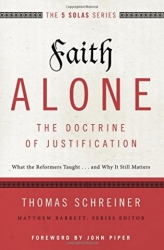Welcome again to Books At a Glance! I’m Fred Zaspel, and we’re continuing our series of brief discussions highlighting the leading features of the Protestant Reformation in this its 500th anniversary year. Today we’re talking to Dr. Tom Schreiner about another of the Reformation slogans, sola fide, faith alone. Among the many excellent books Dr. Schreiner has authored is Faith Alone—one of new the titles in Zondervan’s The Five Solas series.
Tom, welcome! Always great to have you with us.
Schreiner:
Thanks, Fred, it’s good to be on again.
Zaspel:
Just what is meant by sola fide?
Schreiner:
Sola fide means that we’re saved by faith alone and we’re not saved by works. That is, we do not as human beings contribute anything to our justification. Another way of putting it is that we are saved by Christ. If we are saved by faith alone, we are saved by Christ, who died for us and gave himself for us. It’s very much tied up with the notion that we are not saved by our own righteousness, we are saved by the righteousness of Christ. I think that’s the fundamental truth.
Zaspel:
What were the questions at issue in the Reformation that made this such an important point of emphasis?
Schreiner:
I think the church had wandered from this teaching of faith alone. We can think of Augustine as a person who preserved well the teaching of God’s grace in salvation; but, by the time we come to Luther and the Reformers, most had wandered from this clear understanding that justification was by faith alone. You have, for example, Gabriel Biel saying that we really do what is best, and then God will reward us. And Luther recognized experientially and then exegetically and theologically that this theology doesn’t wash. It doesn’t fit with human experience because we can’t do what is best; and it doesn’t fit with the Scriptures. And therefore, he was very depressed and full of torment because, I think, Luther had such a good understanding of infinite holiness and of his own sin.
Zaspel:
How is sola fide related to the other solas?
Schreiner:
Well, if we start with sola Scriptura – where do we get our doctrine? Where do we get our teaching? Where is the authority located? Protestants have always argued, rightly, that our final authority is Scripture alone. We can learn from tradition; reason can assist us in understanding Scripture; but the final authority is Scripture alone. So that’s where we get the truth that it’s by faith alone.
And then I would say faith alone, I think, by definition, implies grace alone. Why is it by faith alone? As I said, it’s not by our works. Our works cannot contribute to our salvation. Well, what saves us, then? What saves us is God’s grace. And, of course, in Scripture, we think especially of the Pauline letters, the statement that we are saved by faith and not by works is tied very closely to the notion that we are saved by grace and that there’s no reason or cause or justification for boasting, since it is God’s grace, God’s favor and love that saved us.
We can move on to another sola, and that is that we are saved through Christ alone. This is exceedingly helpful. Faith alone, as a slogan, could be misleading. Faith alone has to have the proper object. I mean, finally, it’s Christ who saves us. So, the faith that saves us is in Jesus Christ, crucified and risen. Our faith isn’t in ourselves; our faith isn’t in the church; our faith has an object; and, as I mentioned earlier, how does Christ save us? He saves us by dying for us, a risen and ascended one, and he grants us his righteousness. His righteousness is counted to us, it’s imputed to us. So, our salvation rests on faith alone, but it would be vacuous and empty if it were not through Christ alone and his great atoning work on our behalf.
And then, finally, if one understands all these things, then it makes perfect sense that it is to the glory of God alone. If it’s not our work that saves, but it’s Christ that saves, it’s Christ that gives us the power to be saved, then all the glory goes to God. All the praise goes to him. Those of us who are believers, those of us who trust in Christ, we recognize that we have done nothing that we have not received, 1 Corinthians 4:7. And since we’ve received everything, there’s no reason for boasting. Why do we believe and another person doesn’t believe? And the answer is God’s grace; and to him goes all the glory. In and of ourselves we know that we wouldn’t believe, we wouldn’t continue to believe, we’re sinful, we’re weak, we are fallible. So, all the glory, all the praise, all the honor goes to God. And that’s very important, isn’t it? Because these are not just abstract doctrines. They lead us to worship. They give us joy. They lead us to praise and they are a little taste of heaven on earth.
Zaspel:
That’s right. God saves in such a way that only he receives the credit for it, and therein we receive our joy in worshiping him for it.
Schreiner:
Amen.
Zaspel:
So, in answer to the question, “What must I do to be saved?” we say, simply, “Believe on the Lord Jesus Christ, and you shall be saved.” That’s faith alone. And we can say that, simply because Christ has done the work that saves us alone, all by himself. He’s done it.
Schreiner:
Absolutely. Absolutely.
Zaspel:
In what contexts today would you suggest we need this emphasis again?
Schreiner:
Well, I would say we needed everywhere! It needs to constantly be preached and proclaimed in our churches and for our own private lives. But, I think Luther got it right, that we need to relearn the Gospel every day. Of course, we need to preach the whole counsel of God. That if we’re not regularly preaching faith alone, really all five of the solas, they’re bound up together, then were not really preaching the gospel. And I think we’d be quite astonished how many churches are out there that claim to be evangelical, and are evangelical in some sense, but these doctrines are not taught clearly and well and often. And even in churches where these things are taught, we need to continue to teach them and be renewed and refreshed by them. I think there’s a tremendous need. I am continually surprised by people who are in what I think, or thought, were evangelical churches, and they really don’t know the Gospel very well.
Zaspel:
Yeah, that’s right. And often there’s a disconnect between what is believed officially by the church, and what you hear in the pulpit.
Schreiner:
Right. So much emphasis in our pulpits, and we want to help people in practical matters, but a lot of advice on how to live can dominate our pulpits and these truths are often neglected.
Zaspel:
I’ve often known of churches in my background where I’m very certain that the leadership of the church would die for the confession of faith that says the work is done, and the message is not do, but done; but, at the same time, what you hear from them is, do.
Schreiner:
I think that’s exactly right, Fred, and I’ve wondered about this as well. And I think it’s because the pastors and teachers assume everybody knows this. But if we assume something, we easily forget it. And, not only do our hearers not hear it, but I think we start forgetting it ourselves. What we emphasize is what we really represent in our ministries.
Zaspel:
That’s right, and when don’t I need to be reminded that all the work was done by Christ and I have it by grace alone through faith alone.
Schreiner:
And I’d want to say, there, that it’s transforming. When grace truly grips you, when you’re full of joy and praise and awe, it changes your life. So, it is practical.
Zaspel:
There is nothing like it. That’s right, amen.
Before we sign off can you give us a brief overview of your book, Faith Alone?
Schreiner:
The book has sections of history, exegesis, and some practical application. I try to do a tour through history. I look at the early fathers; I consider Calvin and Luther. I think about Baxter and Owen and Wesley and Edwards. I look at the text exegetically, and then I consider some recent developments. I talk about the New Perspective and N. T. Wright; I talk about the document, Evangelicals and Catholics Together and Frank Beckwith’s Return to Rome. Then I consider just what are some practical applications for our everyday lives. So, I wanted to give readers a sense of the whole. I’m not only looking at Scripture, but what do we learn from history regarding this doctrine and what does it mean to our lives, today?
Zaspel:
We’re talking to Dr. Tom Schreiner, author of the book, Faith Alone—The Doctrine of Justification: What the Reformers Taught…and Why It Still Matters. It’s an excellent treatment of a centrally important gospel related theme on which every Christian should be very clear. Thanks for listening in!
Tom—many thanks. I appreciate your good work, and I appreciate your talking with us today.
Schreiner:
Thank you so much, Fred, it was a pleasure to be with you.

